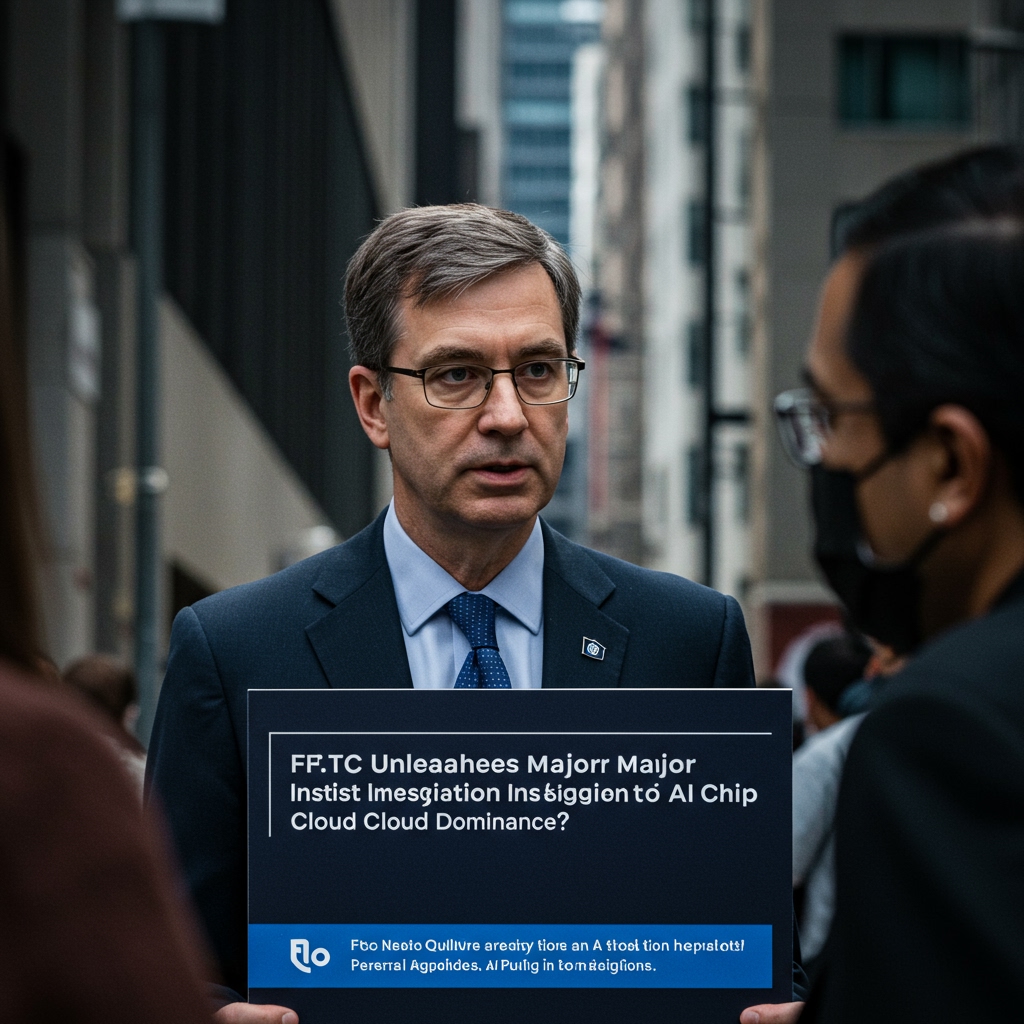FTC Launches Sweeping Antitrust Probe into AI Supply Chain
Washington D.C. – In a significant move signaling heightened regulatory scrutiny over the burgeoning artificial intelligence industry, the U.S. Federal Trade Commission (FTC), under the leadership of Chair Lina Khan, announced on Tuesday, March 25, 2025, the initiation of a broad antitrust investigation. The probe is specifically targeting potential anti-competitive practices within the critical AI supply chain, placing a particular focus on the dominant players in AI chips and cloud computing services.
The Commission stated its intent to meticulously examine whether companies holding significant market power in these foundational AI sectors are employing tactics that could potentially stifle competition or disadvantage smaller innovators and startups striving to enter or expand within the AI landscape. This action underscores growing concerns among policymakers in Washington D.C. regarding the rapid consolidation of market control in core AI technologies.
Context and Growing Concerns
The AI industry’s rapid advancement is seen as transformative, but it heavily relies on key underlying infrastructure: the specialized chips required to train and run complex AI models, and the massive cloud computing platforms that provide the necessary computational power, storage, and associated services. A limited number of companies currently dominate these essential markets, raising alarms about potential bottlenecks, unfair pricing, and control over access to critical resources.
Concerns in Washington D.C. about market concentration in foundational AI technologies have been mounting for some time. Lawmakers, researchers, and industry observers have pointed to the significant barriers to entry for new competitors and the potential for dominant firms to leverage their power in one part of the AI ecosystem to gain unfair advantages in others. This could manifest in various ways, such as preferential access to data, bundling of services, or imposing restrictive terms on customers and partners.
The timing of the FTC’s announcement also comes shortly after the European Union finalized its comprehensive AI Act, a landmark piece of legislation primarily focused on regulating the safety and ethical use of AI technologies. While the EU’s focus has been on deployment and risk, the FTC’s probe signals a distinct regulatory concern in the U.S. centered squarely on the competitive structure of the underlying AI market itself. This indicates a growing global push for regulatory frameworks around AI, albeit with different initial focuses.
Scope of the Investigation
The FTC’s investigation is described as “sweeping,” indicating a broad examination of practices across the targeted sectors. The primary areas of focus are:
* AI Chips: These specialized semiconductors, like GPUs and TPUs, are the fundamental building blocks for modern AI. Their design, manufacturing, and supply are concentrated among a few major companies. The probe will likely examine issues related to supply chain access, pricing practices, interoperability, and potential tying arrangements that could favor a dominant chip maker’s other products or services.
* Cloud Computing Services: Cloud platforms provide the infrastructure necessary to develop, train, and deploy AI models at scale. Dominant cloud providers offer not only raw computing power but also a suite of AI development tools and services. The investigation will likely look into how these providers might use their platform control to disadvantage competitors offering specific AI services or software, or impose restrictive data access or portability terms.
The Commission will seek extensive data and documentation from key industry players. This typically involves detailed requests for internal communications, business strategies, sales data, contracts, and information regarding market share and competitive dynamics. The goal is to gather a comprehensive picture of how these markets function and whether any actions by dominant firms constitute illegal anti-competitive behavior under U.S. antitrust laws.
Potential Outcomes and Implications
The FTC’s investigation is an information-gathering phase, but it is a necessary precursor to potential future actions. Based on the evidence collected, the Commission has several potential paths forward:
1. Enforcement Actions: If the investigation uncovers sufficient evidence of violations of antitrust laws (such as the Sherman Act or Clayton Act), the FTC could file lawsuits against specific companies seeking remedies. These remedies could include injunctions to stop certain practices, requirements to change business models, or even structural relief in more extreme cases.
2. Policy Recommendations: Even if formal enforcement is not pursued or is only part of the response, the findings from the investigation could inform future policy recommendations to Congress or other government agencies regarding the AI market. This could potentially lead to new legislation or regulations aimed at promoting competition.
3. Public Reporting: The FTC may also choose to publish its findings in a report, shedding light on market dynamics and potential competitive issues, which can itself have an impact on industry behavior and public discourse.
This probe signals that U.S. antitrust enforcers view the competitive landscape of foundational AI as a priority area. It places the leading companies in the AI chip and cloud sectors under significant scrutiny. The outcome of this investigation could have profound implications for the structure and future development of the artificial intelligence industry, influencing everything from innovation pathways to the cost and accessibility of AI technologies for businesses and consumers alike.





